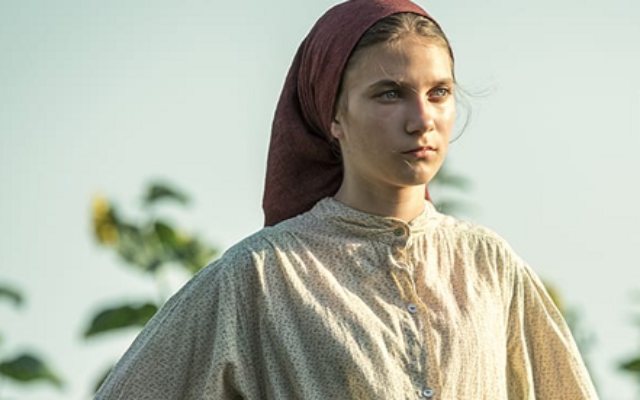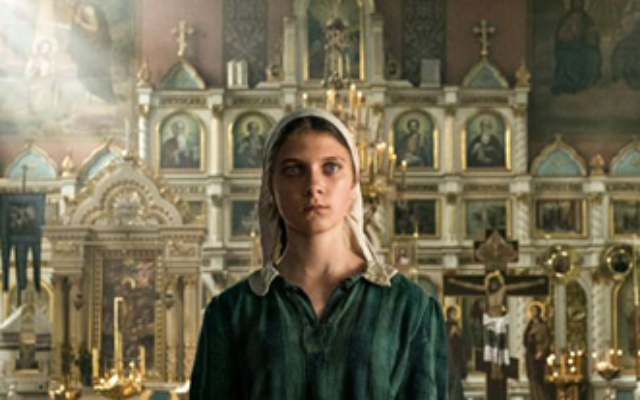‘My Name Is Sara’ Tells Holocaust Story Set in Ukraine
New film describes young teen’s survival amidst farmers who didn’t know she was Jewish.

Sara Goralnick was only 13 when her mother sent her off with her younger brother, Moishe, in the hope of surviving the Nazi destruction of their Jewish community of Korets, close to the Ukrainian border with Poland. The town had long been a center of Jewish life, but after the German invasion of Poland the town and its Jewish ghetto were liquidated.
As dramatized in the just-released film “My Name Is Sara,” which is being screened at the Tara Theater on Cheshire Bridge Road beginning Aug. 5, Sara sets out with her brother in September 1942, determined to survive. Survival, as her mother tells her in the film, “will be our revenge.”
The key to Sara’s survival for two-and-a-half years was her successful ability to take on the identity of a gentile friend she had known in Korets. As she tells another Jewish child she encounters on the run, you will be tested by Ukrainians, who are wary of providing shelter for escaping Jews. She instructs the young girl in the words of the rosary, the Hail Mary prayer and how to make the sign of the cross during religious rites in the church.
Sara Goralnick becomes Manya Romanchuk, a runaway without official documents who convinces the young farm family which takes her in that she is a gentile. She shares a family meal of roast pork as enthusiastically as she attends mass in the local Eastern Orthodox church. But this being Ukraine in World War II, Sara is never far from antisemitism.

Ukrainian nationalists were often willing accomplices in the mass murder of more than a million Jewish residents during the Nazi invasion. The work of the Nazi killing squads, the Einsatzgruppen of the SS, and the murder of 33,000 Jews over a two-day period by German soldiers at Babi Yar, outside Kyiv, were all facilitated by Ukrainian paramilitary units.
According to German historian Dieter Pohl, approximately 100,000 Ukrainians joined German police units, while others became guards at notorious concentration camps such as Treblinka. Sara’s brother, Moishe, who did not survive, was turned in to the Nazis in exchange for a four-pound bag of salt.
But Sara, as played by the young Polish actress Zuzanna Surowy in her acting debut, has a steely sense of self-control and an instinctive ability to adapt that never deserts her. Only when she feels truly alone, as in a dream sequence during an afternoon nap in the forest or while hidden in the farm’s outhouse, do her youthful fears overcome her.
Otherwise, despite living under the watchful eyes of the Nazis and the suspicious gaze of her extended adoptive family, her stony-faced acceptance of her role in this adopted world of Ukrainian peasants never wavers.
It’s a simple premise and a familiar one that has been the basis of a number of previous Holocaust dramas. Director Steven Oritt, a successful documentary filmmaker making his debut with this feature film, befriended the real Sara before her death in 2018. He has transformed veteran screenwriter David Himmelstein’s script into a moving work of Sara’s personal triumph.
Prior to its national release, “My Name Is Sara” was featured in over 50 film festivals, including the Miami Jewish Film Festival, where it won the audience award for best narrative film and the Warsaw Jewish Film Festival, where it was awarded the Grand Prize.
The film was produced with the Shoah Foundation of the University of Southern California, which was founded by Steven Spielberg with the proceeds of his 1993 Academy Award-winning film, “Schindler’s List.” The executive producer, Mickey Shapiro, is the son of Sara Goralnick Shapiro. He was born in a Displaced Persons Camp in Germany after World War II and grew up in Detroit, where he became a highly successful home builder and real estate developer, with over a thousand employees nationwide.
Shapiro serves on the Shoah Foundation’s Board of Councilors and has endowed an annual residential fellowship and lecture program at the USC Shoah Foundation Center for Advanced Genocide Research. His generous support for Holocaust education is a fitting reminder of the power of the words his mother heard when she first took flight — that survival, itself, can be a kind of revenge.
“My historical knowledge,” he says, “coupled with my deep emotions, fuel my need to help ensure these events do not happen again.”
- holocaust
- Tara Theater
- Ukraine
- nazis
- USC Shoah Foundation
- Steven Spielberg
- Steven Oritt
- Zuzanna Surowy
- Sara Guralnick Shapiro
- Arts and Culture
- Local
- Bob Bahr
- Sara Goralnick
- Poland
- German invasion
- My Name Is Sara
- Manya Romanchuk
- Eastern Orthodox
- Einsatzgruppen
- Dieter Pohl
- Treblinka
- David Himmelstein
- Miami Jewish Film Festival
- Warsaw Jewish Film Festival
- University of Southern California
- Mickey Shapiro



comments